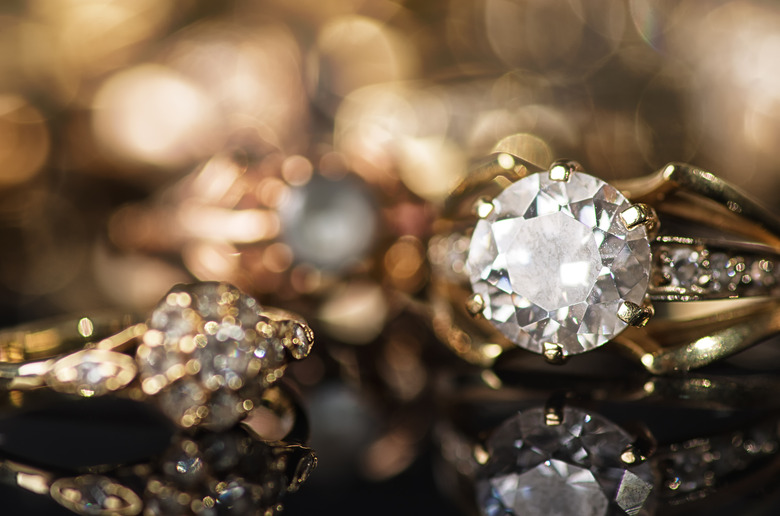How To Tell If A Crystal Is Diamond Or Quartz?
The differences between quartz and diamond crystals start with their chemical compositions. Their molecular differences lead to the characteristics that allow you to tell them apart. Whether in natural crystal form or cut into gemstones, quartz and diamonds can be differentiated using nondestructive techniques such as crystal form, density, specific gravity or refractive index, or destructive methods like hardness tests or cleavage patterns.
TL;DR (Too Long; Didn't Read)
Natural crystals of quartz and diamond form very different crystal shapes. Quartz forms six-sided, elongated crystals that normally only have one terminating end. Diamonds form eight-sided crystals with approximately equal lengths and widths. Differences in density, refractive index, hardness and cleavage also differentiate quartz from diamond, although hardness and cleavage tests require damaging or destroying the crystal.
Natural Crystals
Natural Crystals
In nature, quartz and diamond have very different crystal structures. Quartz's silicon dioxide molecules align to form six-sided hexagonal crystals, usually longer than they are wide. Quartz crystals grow so that only one end terminates in a hexagonal pyramid. An exception are the so-called Herkimer diamonds, which terminate on both ends. On the other hand, the carbon atoms forming diamonds usually arrange themselves into squat isometric crystals. These eight-sided crystals may appear as two pyramids abutted base to base. Diamond crystals, whether single or twinned, measure approximately the same in all directions.
Density and Specific Gravity
Density and Specific Gravity
Density and specific gravity relate the ratio of mass to volume. To calculate density, measure the mass of a material and the volume of the same amount of material, then divide the mass by the volume to find density. The volume of irregularly shaped objects can be measured using water displacement. Place the object in a known volume of water and measure the subsequent change in volume to determine the object's volume. Specific gravity is more commonly used for minerals, however. The mass of the mineral is measured in air and measured again while suspended in water. The specific gravity of quartz ranges from 2.6-2.7 while the specific gravity of diamond ranges from 3.1-3.53. If the crystals of quartz and diamond are the same size, the diamond will be heavier than the quartz.
Refractive Index and Luster
Refractive Index and Luster
Quartz and diamonds make beautiful gemstones. Again, their molecular structure controls the way light plays through the crystals. Luster and refractive index measure that light play. Luster describes how light reflects off the surface. Quartz has a vitreous or glassy luster. Diamonds have an adamantine luster. Luster can be subjective, however. Refractive index, a more accurate measure, takes advantage of the change as light passes from one transparent material to another. The refractive index of quartz ranges from 1.544-1.553 while diamonds measure 2.418. A quick test involves placing the crystal in vegetable oil (average refractive index 1.47) or oil of wintergreen (refractive index 1.536). Quartz will almost disappear in these oils, but a diamond will remain very distinct.
Destructive Testing
Destructive Testing
Quartz and diamond crystals can be distinguished using tests for hardness and cleavage, but these tests will damage or destroy the crystals. Hardness tests the relative hardness of minerals. Quartz has a hardness of 7. Diamond has a hardness of 10. Diamond will scratch quartz, but quartz will not scratch diamond. Topaz (hardness 8) and corundum (hardness 9) will also scratch quartz but not diamond. Diamonds will scratch each other, though. Cleavage requires breaking the crystal to examine the pattern of the break. Diamonds have cleavage planes, parallel to each of the natural crystal faces. Quartz has no cleavage planes, but occasionally shows parting along a weakened plane within the crystal.
Cite This Article
MLA
Blaettler, Karen G. "How To Tell If A Crystal Is Diamond Or Quartz?" sciencing.com, https://www.sciencing.com/tell-crystal-diamond-quartz-8283870/. 23 April 2018.
APA
Blaettler, Karen G. (2018, April 23). How To Tell If A Crystal Is Diamond Or Quartz?. sciencing.com. Retrieved from https://www.sciencing.com/tell-crystal-diamond-quartz-8283870/
Chicago
Blaettler, Karen G. How To Tell If A Crystal Is Diamond Or Quartz? last modified August 30, 2022. https://www.sciencing.com/tell-crystal-diamond-quartz-8283870/
